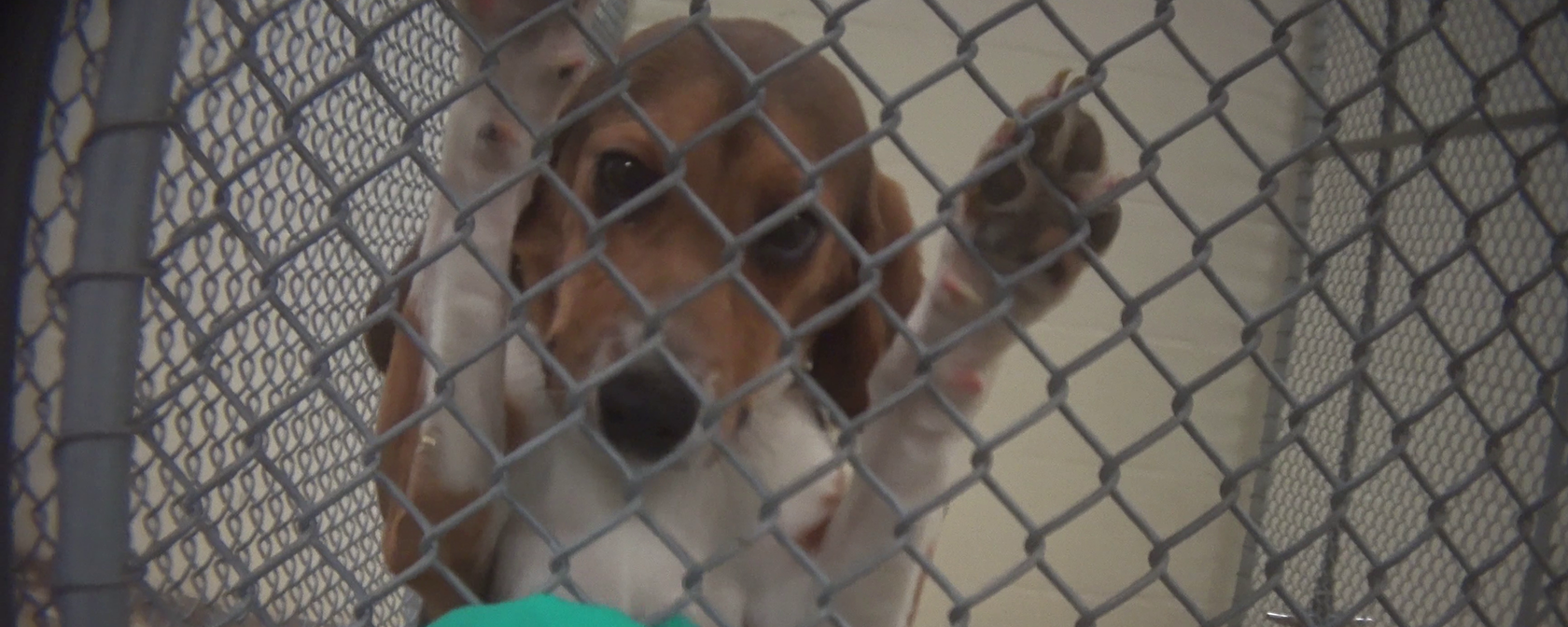By Sara Amundson and Kitty Block
We have been overwhelmed by the outpouring of support for the 82 beagles languishing at Inotiv’s Mount Vernon, Indiana, laboratory that was the site of our recent undercover investigation. A Humane Society of the United States investigator found 80 beagle puppies being force-fed potentially toxic drugs in tests commissioned by Crinetics, a pharmaceutical company in San Diego, along with two adult beagles who’d been being used for years to practice invasive procedures.
Contrary to what Inotiv and Crinetics have claimed, there is no blanket legal requirement from the U.S. Food and Drug Administration for dogs to be used as test subjects or to be killed after a test is over. But, despite hundreds of thousands of advocates calling for their release, Inotiv and Crinetics have so far refused to communicate with us—and so the fate of the 82 beagles remains uncertain.
We have made many attempts to reach out to Inotiv and Crinetics to engage the companies directly. Their silence has made it impossible to determine whether 32 of the puppies were euthanized, as scheduled, but we’re holding out hope that our appeal moved the two companies to release them.
Here are some of the actions we and others have taken on behalf of these dogs and other animals in Inotiv’s laboratory:
- More than 275,000 people signed our petition and/or sent emails urging the dogs’ release.
- Tens of thousands of animal lovers helped spread the word on social media.
- Actress Kim Basinger posted about her concern for the dogs on Instagram and wrote a letter to Crinetics.
- Advocates gathered at events outside Crinetics headquarters in San Diego, at two Inotiv facilities in Indiana and at one site in Maryland where Inotiv hopes to expand its East Coast presence with the help of taxpayer funding.
- Advocates outside the Mount Vernon, Indiana, facility tried to speak with Inotiv representatives and leave behind collars and leashes as a hopeful symbol of the dogs’ potential release. Unfortunately, they were turned away by police after Inotiv officials refused to meet with them.
- At the Maryland event, state Sen. Ben Kramer of Montgomery County and a representative of UFCW Local 1994 MCGEO, a labor union based in the county, made heartfelt appeals to Inotiv to release the dogs.
- Nearly 170 legislators in 32 states sent a joint letter to Inotiv and Crinetics, calling for the dogs’ release. Many of them have expressed their intention to pursue legislation that would address the issue of dog testing and encourage the adoption of dogs and cats after their time in the laboratory.
- More than a dozen states have already passed legislation to enable the adoption of dogs and cats in laboratories, most recently in Iowa, where Gov. Kim Reynolds signed a bill into law after it secured nearly unanimous support at every stage of the legislative process.
- We released a video about our investigation and a second, heartbreaking video highlighting the investigator's experience with two macaques at Inotiv.
As we continue our drive to see these dogs spared, it is gratifying to know that you stand with us and with these animals, and we’re so grateful for all you’ve done. We’re not giving up on these dogs—or any dogs in laboratories. That’s why we’re asking every supporter, including those who took action for the beagles at Inotiv, to take another step to protect dogs and other animals in laboratories by pressing the FDA to end animal testing and prioritize more accurate and effective non-animal methods. We recently met with FDA officials who shared their intentions to do so, but we must all do our part to make sure tangible changes occur. You can help us to forge a future in which animals no longer suffer in laboratories by urging the FDA to commit to transition from animal testing to the use of non-animal methods. It’s a simple action that you can take today, and it could make a world of difference for animals.
Kitty Block is President and CEO of the Humane Society of the United States.




